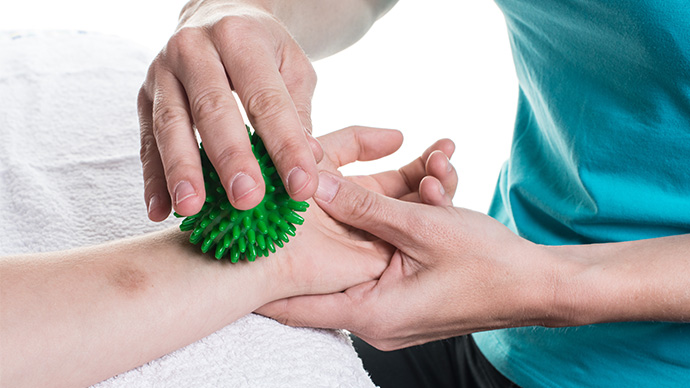In 2013, a 51-year-old Paul was diagnosed with Plasma Cell Leukemia. He started visiting various hospitals, hoping to receive adequate treatments that would help with his condition. His recent admission at St George’s University Hospital has given him a different point of view on his situation. Before receiving Occupational Therapy at St George’s Gordon Smith Ward, he felt like he had lost control over his life, especially his body. However, through Occupational Therapy, he gained more confidence and capabilities, and also learned that he was not the only one affected by this situation. Meghan White, the occupational therapist who worked on Paul case defined Occupational Therapy as a way to help reintroduce patients to daily tasks. It is a way to raise their confidence by teaching them techniques to increase their independence in preparation for discharge.
During Paul’s recent admission at St George’s, he went through a lot of neurological and scientific tests. Yet he found more progress and satisfaction from Occupational Therapy. Paul said that at first he was not really convinced by Occupational Therapy and was too reliant on medical treatments such as Blood tests, cannulas, scans, IVs, and transplants etc.
Paul’s illness resulted in a continuous loss of control over commands sent from the brain to different parts of his body. He had encountered a total loss of strength, coordination, and experienced difficulties in performing simple tasks, which gave him severe pain in his hands.
Paul’s treatment plan included Occupational Therapy which consisted of repetitive physical exercise to enhance motion in his hands. A metaphor used by Paul to describe his treatment experience presented Occupational Therapy similar to the Karate kid movie. Occupational Therapy takes time and consideration. With enough time these specifically designed mental and physical exercises can help recover control over hands, arms, and fingers. People are using their hands to perform almost every daily activity. Therefore when those hands are not used so often, they become totally useless and lose their capacity to perform those daily tasks. They can sometimes become stiff and difficult to use, which might take only a few weeks to become paralysed. That is the main reason why doctors motivate their patients to quickly make use of those hands after surgery.
Paul has also acknowledged that the key success of Occupational Therapy or any Rehabilitation Therapy is the therapist. To him, Meghan White, his Occupational Therapist, had shown unconditional support and energy to help him succeed with his therapy.
At Verita Neuro, we dispense efficient and totally safe treatments for curing multiple diseases through our integrative approach to generate incredible results and help our patients cope with their problems to improve their quality of life.
OCCUPATIONAL THERAPY WITH UNIQUE ACCESS MEDICAL
Occupational Therapy (or OT), is a medical profession specialising in promoting a therapeutic engagement in the use of daily activities. It is the art and science of fostering health, independence, and wellbeing so that all people can participate in daily occupations of life to their fullest potential. Groups of people who would benefit most from Occupational Therapy range from children with disabilities, including Autism, Learning Disabilities, Developmental Delays, or any diseases affecting neurological function; to people with Spinal Cord Injuries suffering from side effects of paralysis, and older people diagnosed with neurodegenerative diseases such as ALS, Ataxia, or Multiple Sclerosis.
While outwardly, being an Occupational Therapist seems like a straightforward job where one simply follows the procedures and reads up existing techniques from the handbook, it is entirely different when implemented in reality. Activities that Occupational Therapists conduct are highly customised depending on an individualised evaluation of each patient’s needs in specific areas of the body; some of which include handicraft like paper folding or clay modeling, muscle engaging exercises like ball throwing or juggling, speech and swallowing enhancement exercises, and even mental development activities. Although all of these therapeutical techniques require mutual perseverance from both sides, maximising the benefits and drawing engagement of the patients highly depend on the therapist’s ability to introduce new and creative ways to carry out these exercises.
Some of the other challenges Occupational Therapists face are from making sure the procedures are carried out with maximum safety where chances of accidents are entirely absent, and also ways of approaching each patient and gaining his or her trust. Aside from physical restraints, the majority of patients who are in need of Occupational Therapy are suffering from diseases that would most likely affect their psychological states as well. Thus, creating an environment where patients trust in the therapists and are able to relax and feel comfortable is crucial, yet extremely challenging considering the uniqueness of each person’s personality. Everyone has different preferences, and to expect an acceptance by all is almost impossible. Despite the long years of training, often times do the therapists still find themselves in the midst of such tests. However, as a lifelong learning process, they, instead, turn these into an opportunity to grow in their career where they take in patient’s likes and dislikes to improve for the better in the future.
In all, the job of an Occupational Therapist is certainly a rewarding one. In almost all cases so far, Occupational Therapy has benefitted patients with various diseases, whom as a result, have now been able to speak and swallow better, perform occupational activities more naturally, and even regain some motor functions in the injured areas otherwise deemed irreversible. To be a part of this major progress in someone’s life is not only a heartwarming experience, but also an inspiration.
Please feel free to contact us if you wish to know more about our treatments and our patient representatives will get back to you to assist you with your enquiries.




 English
English